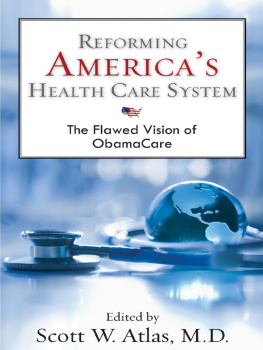 The Hoover Institution gratefully acknowledges the following individuals and foundations for their significant support of the Working Group on Health Care Policy and this publication:
The Hoover Institution gratefully acknowledges the following individuals and foundations for their significant support of the Working Group on Health Care Policy and this publication:
JAN AND JIM BOCHNOWSKI LYNDE AND HARRY BRADLEY FOUNDATION
The Hoover Institution on War, Revolution and Peace, founded at Stanford University in 1919 by Herbert Hoover, who went on to become the thirty-first president of the United States, is an interdisciplinary research center for advanced study on domestic and international affairs. The views expressed in its publications are entirely those of the authors and do not necessarily reflect the views of the staff, officers, or Board of Overseers of the Hoover Institution.
www.hoover.org
Hoover Institution Press Publication No. 602
Hoover Institution at Leland Stanford Junior University,
Stanford, California, 94305-6010
Copyright 2010 by the Board of Trustees of the Leland Stanford Junior University
All rights reserved. No part of this publication may be reproduced, stored in a retrieval system, or transmitted in any form or by any means, electronic, mechanical, photocopying, recording, or otherwise, without written permission of the publisher and copyright holders.
First printing 2010
16 15 14 13 12 11 10 7 6 5 4 3 2 1
Manufactured in the United States of America
The paper used in this publication meets the minimum Requirements of the American National Standard for Information SciencesPermanence of Paper for Printed Library Materials, ANSI/NISO Z39.48-1992.
Cataloging-in-Publication Data is available from Library of Congress
ISBN-13: 978-0-8179-1274-1 (cloth.: alk. paper)
ISBN-13: 978-0-8179-1276-5 (e-book)
To my children, Joe and Ben, who, I hope, will remain free from governmental intrusion to be able to exercise personal choices in pursuit of good health.
FOREWORD
THE DEBATE over the direction of U.S. health care policy continues to occupy center stage in the domestic policy arena and will be prominent in the policy debate for many years to come. In March 2010 Congress passed President Obama's legislation to fundamentally transform America's health care platform in the Patient Protection and Affordable Care Act (PPACA). The plan, also referred to as ObamaCare, radically changes health care availability and delivery in the United States, thus affecting the composition and structure of health insurance benefits for individuals, families, and businesses. The promise of future medical advances stemming from the mapping of the human genome, nanotechnology, and other innovations is bright. But progress will require us to transcend the terms of the current debate, which are often expressed as the competing goals of universal insurance and cost control. The aim of the Hoover Institution's Working Group on Health Care Reform is to devise public policies that enable more Americans to get better value for their health care dollar and foster appropriate innovations that extend and improve life. Key principles guiding the group's policy formation include focusing on the central role of individual choice and competitive markets in financing and delivering health services, individual responsibility for health behaviors and decision-making and appropriate guidelines for government intervention in health care markets. The current core membership of this working group includes Scott W. Atlas, John F. Cogan, R. Glenn Hubbard, Daniel P. Kessler, Mark V. Pauly, and Charles E. Phelps.
In this volume, Reforming America's Health Care System, Scott Atlas and other health policy experts from the United States, Canada, and Western Europe discuss an array of expectations and alternatives to the health reform legislation that should be considered. Because many important aspects of the legislation do not go into effect until 2014, there is ample time to contribute to the ongoing health care debate.
John Raisian
Tad and Diane Taube Director,
Hoover Institution, Stanford University
Stanford, California
PREFACE
A HIGHLY PARTISAN Democrat-dominated Congress passed President Barack Obama's sweeping legislation to fundamentally transform America's health care in the Patient Protection and Affordable Care Act (PPACA) in March of 2010. The plan the president sought, known as ObamaCare, radically changes health care in the United States, audaciously imposing a strong-armed federal government onto perhaps the most personal of all segments of American life. Americans will be forced to buy insurance they may not want or value; businesses will be fined unless they acquiesce to government dictates about the composition, structure, and breadth of health insurance benefits; coverage must be certified as acceptable by government, not by the individuals and their families who receive the insurance; private insurance companies will be forced to price their products according to government fiat, rather than market forces; and doctors will be compelled to accept lower prices for medical care based solely on what bureaucrats determine to be appropriate.
In addition to the dramatic shift of power from individuals to the federal government, the plan significantly expands eligibility for government insurance like Medicaid. This irrational expansion of an entitlement health insurance programone that is already failing and widely acknowledged as financially unsustainablewill also conjure up massive tax increases, including taxes on insurance itself as well as on the very sources of innovative medical technology that have improved and prolonged the lives of Americans so dramatically since the previous era.
Inexplicably, the facts published in the world's top medical journals about our system continue to be ignored:
Americans have the best survival rates from cancer and most serious diseases, and the most rapid decline in breast and prostate cancer deaths despite being hindered with severe obesity and the largest burden of smokers over age fifty of any western nation.
Americans have the most successful, most available treatments for chronic diseases like high blood pressure and high cholesterol.
Americans have the shortest wait times for life-changing surgeries, like cataract and hip replacements, that may not increase survival but greatly impact quality of life.
Americans have the best access to the newest, most effective drugs.
Americans have the quickest access to the safest, most advanced medical technologies.
Americans have the easiest access to specialty doctors, doctors of their choice, doctors who lead the world in health care innovation, regardless of what metrics are used in assessing the sources of medical innovation.
Despite that, most Americans want reforms to bring costs down if quality and choice can be maintained. And reforms could have been achieved without jeopardizing the superior medical care Americans receive right now. After all, the vast majority of Americans already report being very satisfied with their health care system. The would-be reformers could have built on this record with important changes such as breaking down anti-competitive barriers, reducing administrative waste, eliminating mandate-created distortions of the health insurance market, implementing creative tax reforms, introducing reasonable reforms to a medico-legal liability system run amok, and forcing doctors and hospitals to post prices, qualifications, and outcomesinformation that is essential to value-based purchasing and fundamental for stimulating competition. Such genuine reforms would have brought down the cost of insurance, reduced the number of uninsured, increased individual choice, and allowed Americans to make value-based decisions for their families. They would have left Americans free to keep their health insurance, retain their chosen doctor, and manage their own and their family's pursuit of medical care without government control.










 The Hoover Institution gratefully acknowledges the following individuals and foundations for their significant support of the Working Group on Health Care Policy and this publication:
The Hoover Institution gratefully acknowledges the following individuals and foundations for their significant support of the Working Group on Health Care Policy and this publication: